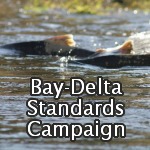Article from Times Standard.
https://www.times-standard.com/2021/06/01/karuk-tribe-declares-climate-emergency/
By Isabella Vanderheiden
PUBLISHED: June 1, 2021 at 1:43 p.m. | UPDATED: June 2, 2021 at 3:36 p.m.
97% of fish test positive for deadly pathogen, tribe says
The Karuk Tribe declared a state of emergency in the Klamath Basin on Tuesday in response to historic drought conditions and a devastating fish kill “that could result in losing an entire generation of salmon.”
“Our monitoring traps are full of dead juvenile salmon,” Toz Soto, fisheries manager for the Karuk Tribe, said in a statement. “The few fish still alive are infected with disease. It’s a catastrophic blow to the fishery and Karuk culture.”
Each year, fisheries biologists monitor the Klamath River for the deadly pathogen Ceratonova shasta, or C. shasta, and use a trap to collect live fish for testing. Low flows and warmer than normal water conditions create the ideal habitat for the parasite to flourish. To date, as many as 97% of sampled juvenile salmon captured between the Shasta River and Scott River stretch of the Klamath have tested positive for the disease.
“(The Bureau of Reclamation’s) decision to not provide flushing flows is allowing a massive juvenile fish kill to take place,” Soto said. “Over 95% of sampled fish are infected. We have to keep as much water in the river as possible to allow some fish to survive.”
Auction for closed brewery equipment set to close this week
Local tribes and environmental groups have called upon the State Water Resources Control Board to immediately address dwindling flows in the Klamath River.
During public comment on non-agenda items in the State Water Resources Control Board’s meeting Tuesday, all but one commenter called upon the board to more to protect Klamath salmon.
Regina Chichizola, co-director of Save California Salmon, called for emergency regulations along the Scott and Shasta rivers to save dwindling coho and chinook salmon species.
“I’m sure many of you are aware there has been a juvenile fish kill that is ongoing in the Klamath River. We’re losing all of our juvenile salmon this year,” she said. “This isn’t the first time this has happened. We pretty much have had no salmon coming back for the last six years in a row and it’s just a devastating situation for our community. I know there’s nothing we can do at this point about these dead fish. However, there is a lot we can do in other situations and into tributaries of the Klamath River.”
Save California Salmon, the California Sportfishing Protection Alliance and the California Water Impact Network recently submitted an emergency water management plan to the board to amend the Bureau of Reclamation’s Sacramento River temperature management plan for the proposed Central Valley Project. The plan will protect Chinook salmon spawning and rearing in the Sacramento, Trinity and lower Klamath Rivers, Chichizola said.
“As you’re aware, sometimes when the Trinity River’s water is transferred too late in the year into the Sacramento River, it actually warms up the Sacramento River and adds to fish kills for winter-run salmon,” she said. “A recent release of warm water for winter-run salmon led to very sick adult salmon and some of them dying from warm water that was released by the Bureau of Reclamation.”
According to a statement from Save California Salmon, the temperature of the water released was far above the 56-degree standard protective of spawning salmon and the 53.5-degree standard needed to protect salmon eggs.
“The releases occurred despite calls from the California Department of Fish and Wildlife and the National Marine Fisheries Service to keep river temperatures at or below 56 degrees,” according to the statement.
Yurok Tribal member Isaac Kinney called for an emergency curtailment of water for agriculture.
“The extraction needs to stop to make sure that future generations understand what culture is,” Kinney said during Tuesday’s meeting. “Water users for big agriculture or with big, unstable and obsolete infrastructure are actually impeding on my religion because the water is tied to my religion. The fish kills are a huge impact to not just Indigenous people but to market economies and all communities throughout California.”
In a prepared statement, Karuk Chairman Russell “Buster” Attebery said, “It’s time to face the reality of climate change.”
“We need long-term solutions to adapt to this new climate immediately or it will be the end for salmon and the cultures that depend on them,” Attebery said, adding that the removal of four dams along the lower Klamath in 2023 is the only silver lining. “… Dam removal will improve water quality, disrupt the habitat for disease vectors, and allow salmon to access historic spawning grounds. We are praying the fish can hang on until then.”









